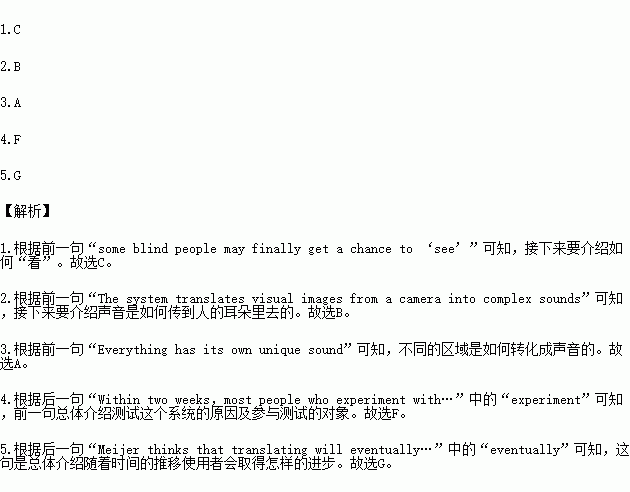题目内容
七选五
Seeing with Sound
According to a British news report,some blind people may finally get a chance to “see”. 1.Dr. Peter Meijer,a scientist at Philips Research Laboratories in the Netherlands,has developed a new system called the vOICe.The three middle letters in vOICe stand for “Oh,I see.” Meijer’s groundbreaking technology may change the lives of visually impaired people all over the world.
A wearable setup of vOICe system consists of a head-mounted camera,stereo headphones and a notebook PC. The system translates visual images from a camera into complex sounds.2.
The program is based on the theory that people can hear certain sounds and learn to translate them into meaningful mental images. Everything has its own unique sound.3.The height of an object or person could be determined by pitch(音调).And a built-in color identifier speaks out color names when it is turned on. What the vOICe users have to learn is which sound goes with which object. Meijer says that he is counting on the brain’s ability to adapt.
4.Within two weeks,most people who experiment with the vOICe system are able to identify objects such as walls and doors. They are also able to identify certain situations,including whether the lights in a room are on or off. 5.Meijer thinks that translating will eventually become automatic for many users of the vOICe,bringing a form of vision to them for the very first time.
A. Brighter areas sound louder than darker areas.
B. It then sends these sounds to a person through headphones.
C. However, they are not learning to see with their eyes;they are learning to see with their ears.
D. The vOICe system is aiming to treat blindness by translating images from a camera into audio signals.
E. Meijer supposes that the brain is interested in the information “content”,but not the information “carrier”.
F. To evaluate the new system’s effectiveness, a number of visually impaired people were chosen to test the v0ICe.
G. Over time, some users have even learned to “watch” television or “recognize” the outlines of buildings as they walk.

